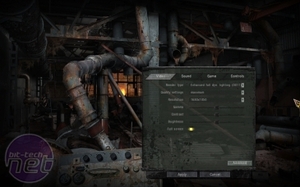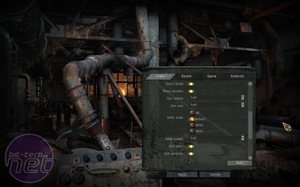Asus Ares Review
Written by Paul Goodhead
July 27, 2010 | 09:13
Tags: #1200 #ares #biggest #custom-cooler #directx-11 #dual-gpu #hd-5970 #loudest #most-expensive #overclocked #overclocking
Companies: #asus

STALKER: Call of Pripyat
Publisher: Deep SilverFrom our STALKER: Call of Pripyat review:
“One place where STALKER: Call of Pripyat definitely excels is in the graphics department, with fancy DirectX 11 tessellation, huge view distances and a gorgeous lighting system that really delivers in wow-factor. Pushing the game up to the maximum settings can require some hefty hardware obviously, but it’s worth the effort if you can because the technical prowess of the game is one thing that’s impossible to fault.”
We run the game at its prettiest, and most demanding, with the image quality set to Maximum and in DX11 mode. We then enter the Advanced settings menu to ramp up every slider to maximum. We leave SSAO (Soft Shadow Ambient Occlusion) at default. We repeat each test three times, discarding anomalous results and averaging the consistent ones.
STALKER: Call of Pripyat
1,680 x 1,050 0xAA 16xAF, DirectX 11, Maximum Detail
- Sapphire HD 5970 Toxic
- Asus Ares
- ATI Radeon HD 5970
- ATI Radeon HD 5850 1GB
- Nvidia GeForce GTX 470 1.3GB
- Nvidia GeForce GTX 460 1GB
- ATI Radeon HD 5830 1GB
- Nvidia GeForce GTX 460 768MB
- Nvidia GeForce GTX 465 1GB
- ATI Radeon HD 5770 1GB
-
-
154
-
97
-
-
-
143
-
84
-
-
-
125
-
78
-
-
-
67
-
54
-
-
-
58
-
47
-
-
-
53
-
44
-
-
-
54
-
41
-
-
-
50
-
41
-
-
-
49
-
38
-
-
-
44
-
35
-
0
25
50
75
100
125
150
Frames per second (higher is better)
-
Average
-
Minimum
STALKER: Call of Pripyat
1,920 x 1,200 0xAA 16xAF, DirectX 11, Maximum Detail
- Sapphire HD 5970 Toxic
- Asus Ares
- ATI Radeon HD 5970
- ATI Radeon HD 5850 1GB
- Nvidia GeForce GTX 470 1.3GB
- ATI Radeon HD 5830 1GB
- Nvidia GeForce GTX 460 1GB
- Nvidia GeForce GTX 460 768MB
- Nvidia GeForce GTX 465 1GB
- ATI Radeon HD 5770 1GB
-
-
125
-
84
-
-
-
122
-
77
-
-
-
110
-
71
-
-
-
58
-
46
-
-
-
48
-
39
-
-
-
47
-
36
-
-
-
44
-
36
-
-
-
42
-
34
-
-
-
40
-
34
-
-
-
41
-
30
-
0
25
50
75
100
125
Frames per second (higher is better)
-
Average
-
Minimum
STALKER: Call of Pripyat
2,560 x 1,600 0xAA 16xAF, DirectX 11, Maximum Detail
- Sapphire HD 5970 Toxic
- Asus Ares
- ATI Radeon HD 5970
- ATI Radeon HD 5850 1GB
- ATI Radeon HD 5830 1GB
- Nvidia GeForce GTX 470 1.3GB
- Nvidia GeForce GTX 460 1GB
- Nvidia GeForce GTX 460 768MB
- Nvidia GeForce GTX 465 1GB
- ATI Radeon HD 5770 1GB
-
-
80
-
61
-
-
-
79
-
57
-
-
-
70
-
52
-
-
-
35
-
28
-
-
-
31
-
24
-
-
-
31
-
24
-
-
-
28
-
23
-
-
-
25
-
20
-
-
-
25
-
19
-
-
-
25
-
19
-
0
10
20
30
40
50
60
70
80
Frames per second (higher is better)
-
Average
-
Minimum
For explanation of what these numbers mean, head to the Results Analysis page.











Want to comment? Please log in.